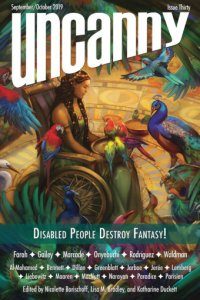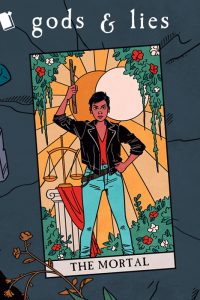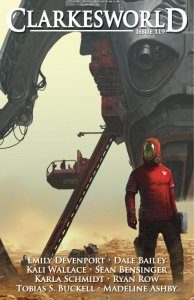Rich Horton Reviews Short Fiction: F&SF, Uncanny, Interzone, Galaxy’s Edge, Not One of Us, and Others
 F&SF 11-12/19
F&SF 11-12/19
Uncanny 9-10/19
Interzone 9-10/19
Galaxy’s Edge 9/19
Not One of Us 10/19
If This Goes On, Cat Rambo, ed. (Parvus Press) March 2019
Tomorrow Girl and Other Stories, Robert Zoltan (Dream Tower) October 2019.
Exhalation, Ted Chiang (Knopf) May 2019.
I was very glad to see two stories in F&SF this month from long-time contributors whom we haven’t seen enough from lately. M. Rickert‘s “Evergreen” is a gentle ghost story about a woman visiting a place where she once lived, at Christmas time. Mourning something, or someone, or – I don’t know. She expects ghosts, and she sees ghosts, but she learns that there is still something beyond those ghosts. Or – does she? I sensed a certain ambiguity. Benjamin Rosenbaum‘s “Rejoice, My Brothers and Sisters” is told by Sparrow, whom we learn is an uploaded personality who has been returned to a body in order to visit a “reservation” of non-uploaded people and report on their condition. They soon learn that they are trapped on the reservation, and that the people there have been deceived about their position and their prospects. Revolution is in the air, but how? What can they do? And what will Sparrow do?
Sam J. Miller‘s “Shucked” is a first-rate horror story. Adney and her boyfriend Teek are on vacation in Italy, and she’s wondering if their relationship is real besides the sex. Then a somewhat creepy older man approaches them with an offer – he’ll pay her for an hour of Teek’s time. Somehow Adney convinces herself to accept the offer – Teek apparently doesn’t mind… but this can’t end well, can it? This is an example of a writer using a fairly familiar idea (which I won’t spoil) so artfully that it becomes newly effective. Strong work. I also enjoyed “How I Came to Write Fantasy” by Michael Libling, a good example of voice and point-of-view driving a story, as the narrator tells of a man he knew years earlier, who claimed to be hundreds of years old, though he looked 19. The narrator tells the details of the unbelievable story, involving witches, a botched spell, and a love affair apparently lasting centuries. The resolution is interesting and sensible – it’s a solid story in its bones, enhanced by the angle Libling tells it from.
Finally, there’s Matthew Hughes‘s latest entry detailing the career of Baldemar. In “A Geas of the Purple School” he is working with his old mentor Vunt as a part of the local Duke’s Eyes and Ears, here investigating a crime which may have implications for the Duke’s succession plan. In particular, it seems possible that there may have been an attempt to place a geas on one of the contenders, the Lady Sabaste. This is an enjoyable sort of fantasy police procedural, and also, as a Wizard of the Purple School becomes entangled, it may have a bearing on Baldemar’s apparent primary career of wizard’s henchman.
In Interzone‘s September-October issue, John Kessel‘s “Fix That House!” is a sly and savage tale about a couple who buy a mid-19th-century mansion in the American South and determine to restore it. “Authenticity was our watchword,” the narrator declares – and the demands of true authenticity are strict! You probably see where this is going, and Kessel takes us there viciously.
Galaxy’s Edge for September again includes several humorous stories – this is a sort of specialty of theirs. I quite enjoyed a cynical dragon story by a writer new to me, P.G. Galalis‘s “A Truer Account of Sir Geoffrey and the Dragon“, in which a dragon gives his version of his dealings with a certain knight, and we learn that, if dragons love treasure that much, they would surely be intrigued by more modern ways of amassing it, including not necessarily up and up financial dealings…. Clever and enjoyable work.
Uncanny‘s September-October issue is another special issue, “Disabled People Destroy Fantasy!” I didn’t think this issue stood out like some previous ones. I did like Karlo Yeager Rodríguez‘s “This Is Not My Adventure“, another variation on the old “revisiting your childhood portal fantasy adventure” theme. Kevin, dealing with his late mother’s things, rediscovers her old wardrobe and tries to escape to the site of his childhood adventure (which is not Narnia, but might as well be). He’s not welcome there… it’s not his place to be. Perhaps, though, the wardrobe still does open for a reason…. A nice reversal of a well-examined trope.
I like to keep an eye on the venerable and simply produced magazine Not One of Us, which has been around for over three decades. The October issue is #62. I thought the best story was the opener, “Bark, Blood, and Sacrifice“, an effectively mysterious story by Alexandra Seidel about a strange house, a girl named Labyrinth, and her brother and two fathers and incest and Inanna and gates… and sacrifice and how this entangles the narrator, somehow drawn to this strange house even after its destruction. It’s just odd, otherworldly, hard to describe, and powerful.
The anthology If This Goes On is explicitly a reaction to the current political state of the US, most particularly the presidency of Donald Trump. Such a focus certainly invites pieces that are more scream than story, to their detriment, and I think that’s true of a lot of the (mostly somewhat short) entries here, but there is some very strong work too. The best – one of the stories of the year – is the opening piece, “Green Glass: A Love Story” by E. Lily Yu, which is a wickedly satirical, yet only too believable, look at the wedding of an ultra-rich couple in the not too distant future. The title refers to an extravagant necklace Richard Hart Laverton III procures for his fiancée, Clarissa Odessa Bell – green spheres fetched from the Moon and returned to Earth to melt on re-entry and then be formed into jewelry. The story lovingly and savagely portrays other extravagances, in so doing showing us an environmentally ruined future and an even more class-stratified society. It’s darkly funny, and very well characterized – exceptional. I also really liked Sarah Pinsker‘s “That Our Flag Was Still There“, which foregrounds a strange idea – every day one person is chosen to be a living flag, allowed to say whatever they want as their skin displays the red, white, and blue. One person remembers what the point of being able to say what you want really is….
Robert Zoltan‘s Tomorrow Girl and Other Stories is an entertaining collection of tales on the theme of battles between creatures from other dimensions that impinge upon our own. The feel is distinctly Van Vogtian (with a soupçon of Lovecraft). There is a certain repetitiveness to some of the pieces, and perhaps a feeling that a more connected narrative is waiting to be developed. The first and last stories, “Tomorrow Girl” and “Martian Cocktail“, are linked. In the first, Stella, an actress for a ’60s TV show called Tomorrow Tales, meets an intriguing man named Max, and soon is told that her strange dreams are reflective of her true life – she’s from Mars centuries in the future, and her destiny is to join Max (and his cat!) in a battle against the Vard, which are sort-of energy creatures. “Martian Cocktail” features Max and Stella again, with Stella now a thief and Max trying for the same special object, and a future Stella is involved as well. You can see why I was reminded of van Vogt, I trust – this is wild stuff, not entirely serious, but fun.
Ted Chiang‘s brilliant collection Exhalation has been widely noticed already, so I’ll be brief. Frankly, my feeling on reading these stories was, appropriately, exhilaration. For those who think they’ve read them all already, I should note that there are two new stories here, plus fascinating notes on each of the pieces. Both new stories are strong, but my favorite was “Omphalos“, which uses a story-generating method Chiang has used before: taking a religious principle as literally true. In this case, the principle is Young Earth Creationism, which is proved by such evidence as old wood without growth rings, and mummies who have been found lacking navels. Thus, people reason, God created the universe several thousand years before, and surely humanity was his purpose. What if, in fact, proof is found that some other planet was actually the center of creation? Chiang examines this revelation through letters from a faithful scientist who is forced to confront such proof. As I said, it’s exhilarating.
Recommended Stories
“Omphalos”, Ted Chiang (Exhalation)
“Fix That House!”, John Kessel (Interzone 9-10/19)
“How I Came to Write Fantasy”, Michael Libling (F&SF 11-12/19)
“Shucked”, Sam J. Miller (F&SF 11-12/19)
“That Our Flag Was Still There”, Sarah Pinsker (If This Goes On)
“Evergreen”, M. Rickert (F&SF 11-12/19)
“Bark, Blood, and Sacrifice”, Alexandra Seidel (Not One of Us 10/19)
“This Is Not My Adventure”, Karlo Yeager Rodríguez (Uncanny 9-10/19)
“Green Glass: A Love Story”, E. Lily Yu (If This Goes On)
Rich Horton works for a major aerospace company in St. Louis MO. He has published over a dozen anthologies, including the yearly series The Year’s Best Science Fiction and Fantasy from Prime Books, and he is the Reprint Editor for Lightspeed Magazine. He contributes articles and reviews on SF and SF history to numerous publications.
This review and more like it in the November 2019 issue of Locus.
 While you are here, please take a moment to support Locus with a one-time or recurring donation. We rely on reader donations to keep the magazine and site going, and would like to keep the site paywall free, but WE NEED YOUR FINANCIAL SUPPORT to continue quality coverage of the science fiction and fantasy field.
While you are here, please take a moment to support Locus with a one-time or recurring donation. We rely on reader donations to keep the magazine and site going, and would like to keep the site paywall free, but WE NEED YOUR FINANCIAL SUPPORT to continue quality coverage of the science fiction and fantasy field.






